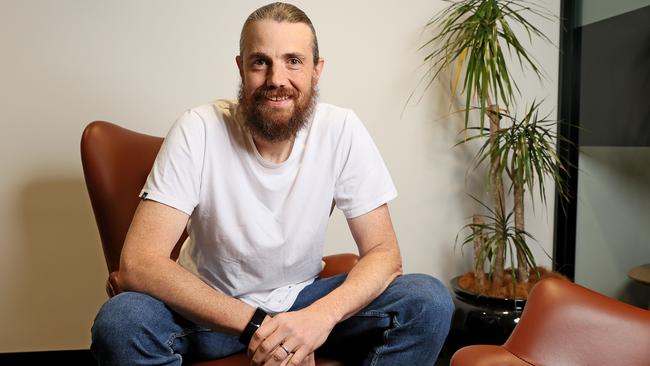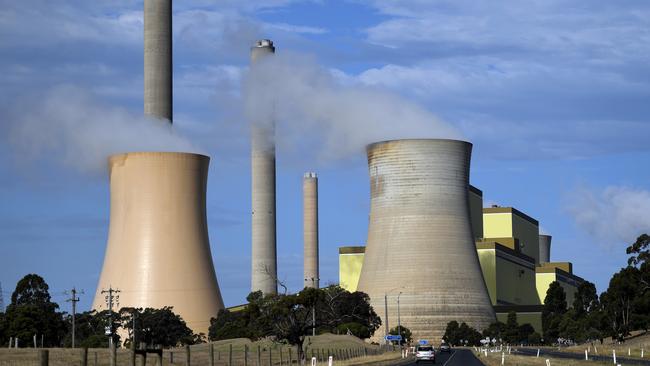AGL Energy rejects $8bn takeover bid from Mike Cannon-Brookes, Canada’s Brookfield
AGL Energy has rejected Mike Cannon-Brookes’ push to accelerate the closure of coal-fired power stations and reshape the energy grid.

AGL Energy has rejected technology billionaire Mike Cannon-Brookes’ audacious push to accelerate the closure of major coal-fired power stations, with an $8bn bid for the company with Canadian asset manager Brookfield.
The offer promises to get AGL out of coal in just a decade under a plan which would reshape the national energy grid and accelerate the uptake of renewable energy technologies.
AGL Energy on Monday morning rejected the bid, saying it materially undervalues the company.
“The proposal does not offer an adequate premium for a change of control and is not in the best interests of AGL Energy shareholders,” AGL chairman Peter Botten said.
“Under the unsolicited proposal the board believes AGL Energy shareholders would be forgoing the opportunity to realise potential future value via AGL Energy’s proposed demerger as both proposed organisations pursue decisive action on decarbonisation.”
The $7.50 a share bid was only pitched at a 4.7 per cent premium to AGL’s closing share price on Friday.
AGL’s board convened an emergency meeting on Sunday afternoon ahead of the formal response.
The bid was structured as a cash proposal with an option for shareholders to take shares in the Brookfield consortium’s firm used for the deal, up to a 20 per cent ownership cap.
AGL said the unsolicited proposal “provided limited other information regarding the structure of the acquiring vehicle and the scrip alternative.”
The power giant’s board said it remains committed to progressing the proposed demerger of AGL Energy to establish two separately listed businesses, AGL Australia and Accel Energy, and considers the proposed demerger will deliver better value for shareholders.
“In the absence of a proposal that provides appropriate value to AGL Energy shareholders on a control basis, the board continues to believe the demerger maximises value for shareholders and is in the best interests of shareholders,” AGL said in a statement.
The bid by Mr Cannon-Brookes the co-founder of technology giant Atlassian, would rid AGL of its unwanted tag as Australia’s biggest polluter and vastly boost its green credentials with future investment focused on renewable generation.
Shareholders in the 180-year-old electricity company had been due to vote in June on a plan to split it into two companies, a green retailer named AGL Australia seeking to be fully carbon neutral by 2040, and a coal-dominated generator, Accel Energy, targeting net-zero emissions by 2047.
But sources said Mr Cannon-Brookes and Brookfield would keep AGL as one business, although they face a series of hurdles to get a deal over the line.
Under the takeover offer, the net-zero goal would be accelerated by 12 years to 2035, sources said.
The bidders’ promise to quit coal even more quickly than AGL’s own recently fast-tracked timeline may win plaudits from green investors.
However, it would cause a fresh problem for Victoria and NSW, where AGL runs massive coal plants, and also the Morrison government, already grappling with the increasingly disorderly exit of ageing coal-fired generators throughout the power grid.
Might be an afternoon espresso kind of day ☕ï¸
— Mike Cannon-Brookes 👨ðŸ¼â€ðŸ’»ðŸ§¢ðŸ‡¦ðŸ‡º (@mcannonbrookes) February 20, 2022
The stunning move on AGL by one of Australia’s most high profile investors caps a whirlwind year of deals for the nation’s energy industry amid a broader global supply squeeze and pressure from investors for businesses to combat climate change.
Woodside Petroleum and BHP Petroleum are tying up a $40bn merger, Santos swallowed Oil Search in a $21bn deal and a raft of global companies like Shell and Iberdrola are looking to build big businesses in Australia, piling pressure on AGL, Origin Energy and EnergyAustralia.
Grattan Institute energy analyst Tony Wood said any takeover deal might produce extra volatility in the electricity market and stoke fears the rapid withdrawal of coal could hike household power bills.
“If you’re looking to bring coal closures even further forward from where we are today, it throws a lot more uncertainty into a market that’s already uncertain. New generation will undoubtedly get built, but it does signal you will likely see more volatility along the way,” Mr Wood said.
The swifter-than-expected exit of coal from Australia’s power grid is forcing the nation’s biggest electricity companies to redraw their investments this decade, with Origin Energy the latest to move after speeding up the closure of the country’s biggest coal plant, Eraring, to 2023 – seven years earlier than planned.
AGL itself on February 10 conceded it might accelerate closure dates for two of Australia’s biggest coal plants, again depending on market conditions, underlining the speed of cheap renewables undercutting coal and raising fears of a bumpy transition as the fossil fuel exits the grid.
To meet its climate goals, AGL has only just laid out a plan to close the doors of the Bayswater coal plant in NSW’s Hunter Valley by 2033, two years earlier than forecast, while Victoria’s Loy Yang A facility faces the axe by 2045, from its expected retirement in 2048.
The two facilities account for nearly 10 per cent of Australia’s emissions, and Mr Cannon-Brookes and Brookfield have outlined a vision for heavier investment in renewable energy generation to offset the loss of the fossil fuel from the grid.
The $7.50 bid, worth $8bn including debt, is a modest 5 per cent fillip on AGL’s last closing share price and is expected to be rejected by the company’s board as undervaluing the company – even though it’s an attractive 20 per cent premium to its 30-day average traded price. Competition issues may also prove a major hurdle. Brookfield, which has previously bought private hospital operator Healthscope and freight firm Asciano, just led a consortium that paid $10.2bn to take control of Victorian electricity grid owner AusNet Services.
Buying AGL and tapping into AusNet for billions of dollars of transmission investment needed to transport surging investment in renewables would be an attractive package for Brookfield, but may fall foul of the competition regulator.
Investment bank Macquarie is advising AGL, while Jarden and Citi are on hand for Brookfield.
AGL declined to comment while Brookfield and Mr Cannon-Brookes’ family investment -vehicle, Grok Ventures, were unavailable for comment, although the billionaire sent out a message on Twitter.
Mr Cannon-Brookes, valued at $30bn by The List – Australia’s Richest 250, is the co-founder of tech giant Atlassian but has also emerged as a major figure in ¬climate and renewable energy circles.
A Twitter bet the tech titan made with Tesla boss Elon Musk in 2017 helped spark the world’s biggest battery in South Australia.
Grok Ventures has backed a raft of firms, including solar fintech Brighte, carbon firm Soil Quest, renewable firm Drift and the $30bn solar power export project Sun Cable, in partnership with fellow billionaire Andrew Forrest.
He and his wife Annie have also committed $1.5bn of their fortune to climate change philanthropy and called on corporate Australia to do the same.
The takeover move revealed on Sunday “is potentially game changing for the Australian electricity transition”, WWF Australia’s energy transition manager Nicky Ison said on Twitter.
Coal, which provides up to 70 per cent of current electricity capacity, could be entirely shut as early as 2040 under a system plan by the Australian Energy Market Operator, which runs the power grid.
That is up to a decade earlier than current scheduled retirement dates outlined by their owners, and AGL boss Graeme Hunt has said significant investment would be needed to replace the lost capacity, which had been factored into its broader demerger plan set to take place in the June quarter.
AGL’s planned coal offshoot, Accel Energy, plans to develop Loy Yang, Bayswater and Torrens Island into major energy hubs spanning hydrogen through batteries.
It’s also in talks with partners to establish a fund called the Energy Transition Investment Partnership, aimed at supporting Accel in funding low-carbon developments with a 2700 megawatt pipeline of projects included in the scheme.
Accel would manage the fund known as ETIP in addition to handling development, output marketing, construction, asset and dispatch functions.
Bayswater produces enough power for 2 million Australian households and combined with AGL’s Liddell station, set to close next summer, supplies 35 per cent of NSW power.
More Coverage







To join the conversation, please log in. Don't have an account? Register
Join the conversation, you are commenting as Logout